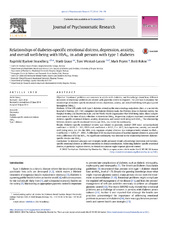Relationships of diabetes-specific emotional distress, depression, anxiety, and overall well-being with HbA1c in adult persons with type 1 diabetes
Peer reviewed, Journal article
Published version
Permanent lenke
https://hdl.handle.net/1956/8585Utgivelsesdato
2014-09Metadata
Vis full innførselSamlinger
Originalversjon
https://doi.org/10.1016/j.jpsychores.2014.06.015Sammendrag
Objective: Emotional problems are common in adults with diabetes, and knowledge about how different indicators of emotional problems are related with glycemic control is required. The aim was to examine the relationships of diabetes-specific emotional distress, depression, anxiety, and overall well-being with glycosylated hemoglobin (HbA1c). Methods: Of the 319 adults with type 1 diabetes attending the endocrinology outpatient clinic at a university hospital in Norway, 235 (74%) completed the Diabetes Distress Scale, the Problem Areas in Diabetes Survey, the Hospital Anxiety and Depression Scale, and the World Health Organization-Five Well-Being Index. Blood samples were taken at the time of data collection to determine HbA1c. Regression analyses examined associations of diabetes-specific emotional distress, anxiety, depression, and overall well-being with HbA1c. The relationship between diabetes-specific emotional distress and HbA1c was tested for nonlinearity. Results: Diabetes-specific emotional distress was related to glycemic control (DDS total: unstandardized coefficient = 0.038, P b .001; PAID total: coefficient = 0.021, P = .007), but depression, anxiety, and overall well-being were not. On the DDS, only regimen-related distress was independently related to HbA1c (coefficient = 0.056, P b .001). A difference of 0.5 standard deviation of baseline regimen distress is associated with a difference of 0.6 in HbA1c. No significant nonlinearity was detected in the relationship between diabetesspecific distress and HbA1c. Conclusions: To stimulate adequate care strategies, health personnel should acknowledge depression and diabetesspecific emotional distress as different conditions in clinical consultations. Addressing diabetes-specific emotional distress, in particular regimen distress, in clinical consultation might improve glycemic control.

